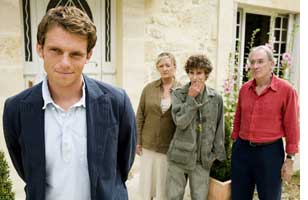
 |
||||||
|
GAY
FILM REVIEWS BY MICHAEL D. KLEMM
|
||||||
|
Times
Have Been Better PictureThis! Director: Screenplay: Starring: Unrated, 93 minutes |
Life
Goes On
Coming out stories can be a dime a dozen and I once wrote, perhaps unfairly, that I never wanted to see another one again. But, like any genre, the coming out tale can be a cliche-fest or the writer can rise to the occasion and give it a new spin. It is possible to ignore the standard formulas and devise situations that are honest, convincing and real. It helps when it's done without resorting to slapstick and melodrama. Laughter is the best medicine and, as anyone who has ever studied the plays of Moliere knows, the French write delightful comedies that are lightyears ahead of the average sitcom. |
|
Before we become acquainted with Jeremy, we meet his family. Guy, the father (Bernard Le Coq) is first seen wearing a flowered apron while singing and dancing to rock music on the radio as he cooks breakfast. "Parents are funny," the younger son, Robin (Olivier Gueritee) remarks in voice-over, "They may be the only people you can admire and find tacky at the same time." Jeremy is coming in from Paris for an unexpected visit and Rosin, the mother, (Charlotte de Turckheim) is convinced that he is coming with bad news. Robin knows his brother's secret and is surprised when Jeremy tells him that he plans to come out today. "Our parents are liberal," Jeremy says, "they won't care." |
|
|
Jeremy's parents discover that they are not as liberal as they once thought. Guy gets more and more annoyed as all his friends and co-workers congratulate him on Jeremy's promotion when all he can think of is his son's boyfriend. Every conversation brims with unintentional innuendo. A woman looks at Jeremy's picture and says "all the girls must be after him." All of this, along with the contrasting scenes where Guy and Rosin broach the subject to their friends, is very funny without being in the least bit rude. Guy seems to be taking the news worse than Rosin who, in turn, is beginning to find her husband's anger irritating. "How can anyone make love to a man?" he snarls with disgust. At this exact moment, she walks into the room, is taken aback by his comment, and then mutters under her breath, "Indeed, how?" Guy begins smoking again and takes his wife's sleeping pills. Sedated, he drifts off to sleep and asks "Do you think he gets buggered?" |
|
 In
fact, Guy seems obsessed with the sexual dimension to their son's declaration
of queerness. His tennis buddies, who haven't a clue what they are talking
about, assure him that there's always a "queen" and a "man" when two guys
do it and that Jeremy is obviously the man. Younger son Robin still
lives with them and he feels that Mom and Dad are taking out their frustrations
on him. When Robin shouts "I don't ask if you bugger Mom," his father slaps
him. Robin will embark on a rebellion of his own when he decides to follow
his dream by taking a job with a film crew rather than attend college and
this just adds to the tension. Meanwhile, Mom and Dad drive to Paris to
see Jeremy's swanky new apartment and also to meet his boyfriend, Marc.
Guy initially drives the wrong way and Rosin has a quiet epiphany in the
passenger seat as she realizes that she and her husband are moving in different
directions and have grown worlds apart. In
fact, Guy seems obsessed with the sexual dimension to their son's declaration
of queerness. His tennis buddies, who haven't a clue what they are talking
about, assure him that there's always a "queen" and a "man" when two guys
do it and that Jeremy is obviously the man. Younger son Robin still
lives with them and he feels that Mom and Dad are taking out their frustrations
on him. When Robin shouts "I don't ask if you bugger Mom," his father slaps
him. Robin will embark on a rebellion of his own when he decides to follow
his dream by taking a job with a film crew rather than attend college and
this just adds to the tension. Meanwhile, Mom and Dad drive to Paris to
see Jeremy's swanky new apartment and also to meet his boyfriend, Marc.
Guy initially drives the wrong way and Rosin has a quiet epiphany in the
passenger seat as she realizes that she and her husband are moving in different
directions and have grown worlds apart. |
|
 The
emphasis here is more on the parents' journey to acceptance but this isn't
one of those well-meaning, yet awful "problem of the week" American TV movies
from the 1980s (so hated by Vito Russo in The Celluloid Closet) that
always favored the family while marginalizing the gay protagonist into an
almost non-entity. Guy and Rosin don't go totally mental over their son's
news but they aren't dealing with it very well either. Their reactions are
very realistic, adding to its comedy, which makes watching Times
Have Been Better a complete delight. For example, when the
parents meet Marc (who is an attractive man but clearly older than Jeremy),
Rosin wants to both scream and crack up laughing. As they all sit down to
dinner, Rosin angers her husband by joking about the way he dances in a
flowered apron whenever he's in the kitchen. The insights are authentic
and what could have been a conventional film is still very queer. The
emphasis here is more on the parents' journey to acceptance but this isn't
one of those well-meaning, yet awful "problem of the week" American TV movies
from the 1980s (so hated by Vito Russo in The Celluloid Closet) that
always favored the family while marginalizing the gay protagonist into an
almost non-entity. Guy and Rosin don't go totally mental over their son's
news but they aren't dealing with it very well either. Their reactions are
very realistic, adding to its comedy, which makes watching Times
Have Been Better a complete delight. For example, when the
parents meet Marc (who is an attractive man but clearly older than Jeremy),
Rosin wants to both scream and crack up laughing. As they all sit down to
dinner, Rosin angers her husband by joking about the way he dances in a
flowered apron whenever he's in the kitchen. The insights are authentic
and what could have been a conventional film is still very queer. |
|
 Nicolas
Mercier's writing is sharp. Robin exposes his father's hypocrisy when he
reminds him that he had "free love" when he came of age in the 60s
and it was just an excuse to get laid. "You guys got it all wrong," he says,
wise for his youth, "It took a disease for you to acknowledge gay guys."
This is heavy stuff, mixed with dialogue that is reminiscent of Oscar Wilde
for its wit. "Introducing your parents isn't a great aphrodisiac," Mark
remarks when Jeremy isn't in the mood and pulls away from him. Rosin's gay
boss, Yvan (Franck de la Personne), delivers many bitchy one-liners and
tells her to stop being "St. Rosin, patron saint of gay men's Moms." Nicolas
Mercier's writing is sharp. Robin exposes his father's hypocrisy when he
reminds him that he had "free love" when he came of age in the 60s
and it was just an excuse to get laid. "You guys got it all wrong," he says,
wise for his youth, "It took a disease for you to acknowledge gay guys."
This is heavy stuff, mixed with dialogue that is reminiscent of Oscar Wilde
for its wit. "Introducing your parents isn't a great aphrodisiac," Mark
remarks when Jeremy isn't in the mood and pulls away from him. Rosin's gay
boss, Yvan (Franck de la Personne), delivers many bitchy one-liners and
tells her to stop being "St. Rosin, patron saint of gay men's Moms." |
|
 Among
the film's many strengths are the finely drawn and fully rounded characters.
These are not one-dimensional ciphers. The best comedies sometimes almost
make you cry; I'm thinking here of that rare film like Charlie Chaplin's
City Lights. Consider this moment: Tempers flare between the parents
and Rosin walks out. Hanging out in a Paris gay bar with her boss, Rosin
meets a suave gentleman (think a French Ricardo Montalban) who sweeps her
off her feet. I won't give away what happens but, when he kisses her, Rosin
remembers what it feels like to be a woman again and Charlotte de Turckheim's
performance in this scene is one for the ages. This incident, along with
the many other developments during the film, justifies Rosin's rebuke to
Jeremy that "since you came home last weekend everything went wrong." While
watching those afore-mentioned TV movies, we cringed when the mothers spouted
similar stuff but my reaction was different here; probably because the poor
woman is right. Among
the film's many strengths are the finely drawn and fully rounded characters.
These are not one-dimensional ciphers. The best comedies sometimes almost
make you cry; I'm thinking here of that rare film like Charlie Chaplin's
City Lights. Consider this moment: Tempers flare between the parents
and Rosin walks out. Hanging out in a Paris gay bar with her boss, Rosin
meets a suave gentleman (think a French Ricardo Montalban) who sweeps her
off her feet. I won't give away what happens but, when he kisses her, Rosin
remembers what it feels like to be a woman again and Charlotte de Turckheim's
performance in this scene is one for the ages. This incident, along with
the many other developments during the film, justifies Rosin's rebuke to
Jeremy that "since you came home last weekend everything went wrong." While
watching those afore-mentioned TV movies, we cringed when the mothers spouted
similar stuff but my reaction was different here; probably because the poor
woman is right. |
|
|
Things are perhaps
tied up a bit too neatly at the end but, in this case, it doesn't ring
false. One leaves the film feeling that there might be some closure here
but also that they still have a lot of unresolved issues to deal with.
In any case, the journey there is what matters. Life goes on. This is
a beautifully shot, acted and directed film. While it doesn't break any
new ground, director Regis Musset isn't trying to be the next Godard either.
Times Have Been Better is
a solidly crafted, and entertaining story, and what else should one ask
for? Check this one out, you'll be charmed. Charlotte de Turckheim
also appears in:
|
|